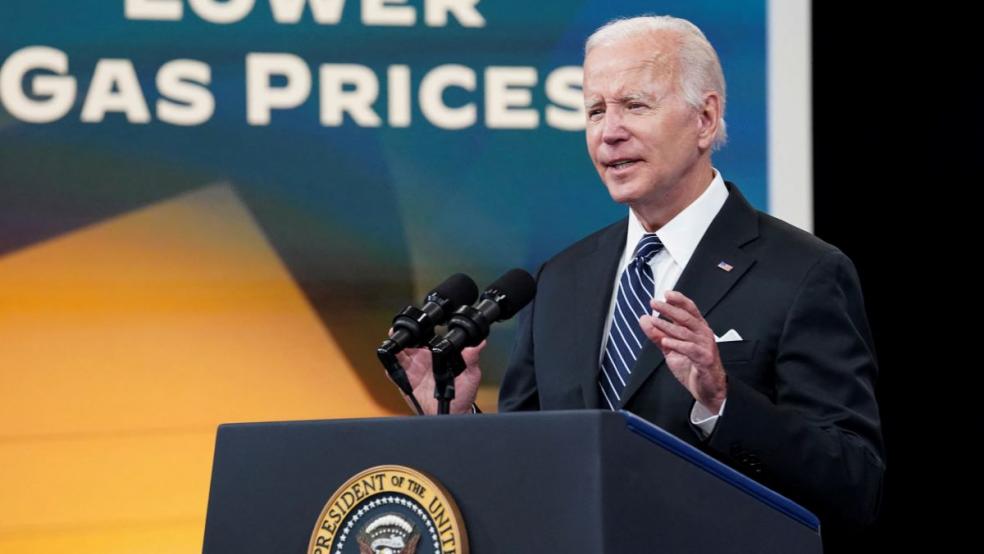President Joe Biden on Wednesday called on Congress to declare a fuel tax holiday through September, but the request is generating little excitement on Capitol Hill, with few lawmakers expressing support for the plan and little expectation that it will come to fruition.
Biden said he wants lawmakers to suspend the 18.4 cents per gallon tax on gasoline and 24.4 cents per gallon tax on diesel for three months in order “to give Americans a little extra breathing room as they deal with the effects of Putin’s war in Ukraine.” Since a fuel tax holiday would reduce the flow of cash into the federal Highway Trust Fund, which helps pay for road repair and construction in the U.S., Biden also called on Congress to cover the lost funding from other sources.
“With our deficit already down by a historic $1.6 trillion this year, the President believes that we can afford to suspend the gas tax to help consumers while using other revenues to make the Highway Trust Fund whole for the roughly $10 billion cost,” the White House said in a fact sheet.
Biden also called on states to take steps to lower fuel costs. “Already, some states and local governments have acted: for example, in Connecticut and New York, governors temporarily suspended their gas taxes, and in Illinois and Colorado, governors delayed planned tax and fee increases,” the White House said. “The President believes more states and local governments should do so.”
And the president asked oil companies to invest in extra refining capacity to reduce prices in the long run, and gas station owners to do what they can. “These are not normal times, bring down the price you are charging at the pump to reflect the cost you are paying for the product,” Biden said at the White House. “Do it now. Do it today, your customers, the American people, they need relief now.”
More yawns than cheers: The proposed tax holiday has few supporters. As we noted yesterday, many economists think fuel suppliers will claim most of the windfall, with consumers saving just a few cents a gallon. Worse, if both state and federal taxes were eliminated, the price reduction would likely be more substantial – but risk increasing demand, creating upward pressure on prices once again.
Rep. Peter DeFazio, the Massachusetts Democrat who chairs the House Transportation and Infrastructure Committee, pushed back against the proposal. “I urge my colleagues to see this for what it is: a short-sighted proposal that relies on the cooperation of oil companies to pass on miniscule savings to consumers – the same oil companies that made record profits last year and a staggering $35 billion in the first quarter of 2022,” he said in a statement.
DeFazio also warned of the potential harm the “well-intentioned but ill-conceived policy” could inflict on infrastructure funding: “Suspending the federal gas tax will not provide meaningful relief at the pump for American families, but it will blow a multi-billion-dollar hole in the highway trust fund putting funding for future infrastructure projects at risk.”
Sen. Joe Manchin also expressed concerns about the budgetary effects of a tax holiday. "Now, to do that and put another hole into the budget is something that is very concerning to me, and people need to understand that 18 cents is not going to be straight across the board -- it never has been that you'll see in 18 cents exactly penny-for-penny come off of that price," Manchin told ABC News.
Republicans, usually more receptive to any kind of tax cut, were no more supportive. “This is nothing but a midterm election gimmick,” Sen. Bill Hagerty (R-TN) told Fox News. “They’re trying to buy votes right now with this. … And you know, a short-term gimmick like this is just nothing but that. Very shortsighted. It will not fix the inherent problem.”
The bottom line: The White House is desperately looking for ways to ease pain at the pump as gas prices hover near $5 per gallon, but in the short run, there may be little the administration can do.




